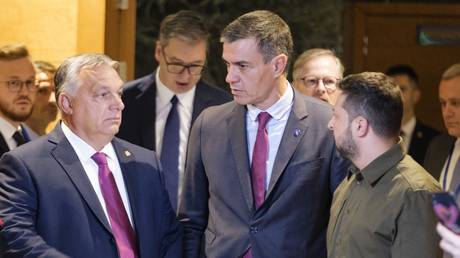
With Hungary poised to veto $54 billion in proposed funding, willing donors are considering other options, the newspaper says
Kiev’s main backers in the EU may overcome Hungarian opposition to the proposed allocation of $54 billion in long-term aid for Ukraine by providing funds outside of the bloc’s joint budget, the Financial Times reported on Tuesday.
The European Commission is seeking to provide the funding over the next four years through the so-called Ukraine Facility. The money is intended to help Kiev with its conflict with Russia, as well as for its reconstruction efforts.
Hungary, which has been highly critical of Brussels’ approach to the Ukraine crisis, has indicated that it would veto the decision during a summit of leaders on Thursday.
The Ukrainian government is counting on the money for its 2024 budget and has warned of “devastating consequences” if the EU comes up short, Foreign Minister Dmitry Kuleba told journalists on Monday ahead of a meeting with his European counterparts in Brussels.
Deputy Prime Minister Olga Stefanishina said a failure to allocate the money would be “a failure of the entire European Union” that would impact Kiev’s chances of getting more aid from the US as well.
According to the FT, Kiev’s supporters in Brussels want to sweeten the deal for Budapest by releasing EU budget funds that were frozen due to Hungary’s perceived lapses in the rule of law and corruption.
The alternative is to have the other 26 members pool resources, the newspaper said, citing people familiar with the talks on what one of the sources called a “plan B.” Diplomats are privately discussing “the feasibility and technical details” of such a move.
EU foreign policy chief Josep Borrell urged national leaders to “stubbornly support” Ukraine for the sake of bloc unity after the ministerial meeting.
Hungarian Minister for EU Affairs Janos Boka told the FT that his government was not likely to change its position. He claimed that the reported consent-for-frozen-funds deal would amount to “political blackmail not from Hungary, but against Hungary” by Brussels.
However, he added that it was feasible for assistance outside of the EU budget to be provided. This would involve “member state contributions, mutual member state guarantees, a much shorter planning period of one year instead of four years,” and would be “under the clear political leadership of the member states.”
Budapest has argued that the tens of billions of dollars and euros poured into Ukraine by Western donors have failed to end the bloodshed. Nations should instead pressure Kiev and Moscow into peace talks, the Hungarian government believes.
READ MORE: Ukraine promises to ‘jump and dance’ for EU
Russia says Ukraine’s uncompromising position and refusal to accept the reality on the ground is standing in the way of resolving the crisis. Moscow wants its neighbor to be “neutral, non-aligned and nuclear-free” as well as respectful of the rights of its ethnic Russian minority, Foreign Ministry spokeswoman Maria Zakharova said last week.




